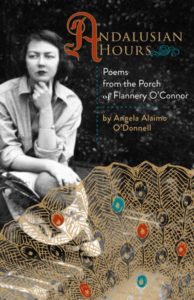If you read, you’ve been there. It may be a single book, or it may be an author. It may be a literary work, or a popular novel you pick up at the grocery store. But each page shouts that you’ve found a kindred spirit, someone who occupies your mind and knows you as well as you know yourself.
I can name books through which that’s happened to me: The Pier Falls by Mark Haddon, All the Light We Cannot See by Anthony Doerr, A Whispered Name by William Brodrick, The War of the End of the World by Mario Vargas Llosa, Farewell, I’m Bound to Leave You by Fred Chappell, Grief Is the Thing with Feathers by Max Porter, and David Copperfield by Charles Dickens. There are others, including a short story. I first read “A Good Man is Hard to Find” by Flannery O’Connor in the 1970s, and as soon as I began reading, I knew with dead certainty what exactly was going to happen. As bizarre as that story was and remains, it is about the American South I grew up in and recognized.
For writer and teacher Angela Alaimo O’Donnell, the kindred spirit is that same Flannery O’Connor. She’s published Flannery O’Connor: Fiction Fired by Faith; The Province of Joy: Praying with Flannery O’Connor, a book of hours based on O’Connor’s theology and imagination; and the forthcoming Radical Ambivalence: Race in Flannery O’Connor. And because O’Donnell is also a poet, with eight published collections, it was perhaps inevitable that she would create a poetry collection framed by her kindred spirit.
Andalusian Hours: Poems from the Porch of Flannery O’Connor contains 101 sonnets structured around the daily liturgy of the hours — Lauds, Terce, Sext, None, Vespers, Compline, and Matins. Each sonnet is preceded by and flows from a quotation — a statement, observation, or insight, almost always from O’Connor but occasionally by others. The poems cover a broad landscape of subjects — from faith, love, and writing to her beloved peafowl and the disease that finally claimed her life (lupus). The title comes from the name she gave to her home in Georgia, borrowed from the southernmost province of Spain.
As you read the poems, you realize what O’Donnell has done. She has set you down on O’Connor’s front porch in Milledgeville, Georgia, and allowed you to listen as O’Connor shells beans, chats with her mother, writes her letters, and makes those simple, everyday observations that are so often startling in their simplicity and aptness. The poems are organized around the liturgy because, for one thing, O’Connor was a practicing Catholic. The effect is to create the sensation that, while you may be sitting on her front porch, you you’re also in an abbey, listening to her Georgia/Southern accent against a background of Gregorian chants.
This is no small achievement on O’Donnell’s part. It is also no small achievement that the poems sound like they were all composed by O’Connor herself. I’ve read all of O’Connor’s short stories, the collection of her letters entitled The Habit of Being, and her essays in Mystery and Manners, but you don’t need that background to appreciate what O’Donnell has accomplished.
Any poem in the collection could be singled out to show this; here’s one about an author O’Connor admired.
Flannery & Poe

to wear his glasses and married his granny
by mistake. That was good fiction to my
young mind. In what world other than Poe’s
would the madmen take over and run
the asylum more sanely than the sane?
Misery that he was, he had an eye
for the ridiculous which suited me
just fine. We both shared a good nose
for the macabre which odors all our days.
I come not to bury but to praise
his dark art, this literary black rose
who perfumes my work with his strange scent
teaching me his sober merriment.

Angela Alaimo O’Donnell
In addition to the nonfiction works noted above, O’Donnell’s eight collections of poetry are Andalusian Hours, Still Pilgrim, Saint Sinatra & Other Poems, Moving House, Waking My Mother, Lovers’ Almanac, Waiting for Ecstasy, and Mine. Her poems have been published in numerous literary journals and magazines. She’s a professor at Fordham University in New York City, where she teaches English, creative writing, and American Catholic Studies. She was graduated from Penn State University and received her master’s and Ph.D. degrees in English Language & Literature from the University of North Carolina at Chapel Hill.
Andalusian Hours is a collection of poetry, but it is also a fine introduction to O’Connor’s writings and especially her mind. It is also a tribute to one of the 20th century’s most original American writers.
Related:
Poets and Poems: Angela Alaimo O’Donnell and “Still Pilgrim”
Photo by Nathalie, Creative Commons, via Flickr. Post by Glynn Young.
__________________________

“I require all our incoming poetry students—in the MFA I direct—to buy and read this book.”
—Jeanetta Calhoun Mish
- Poets and Fables: Steven Flint and “The Sun and the Boy” - July 3, 2025
- Poets and Poems: Alison Blevins and “Where Will We Live if the House Burns Down?” - July 1, 2025
- Poets and Poems: Paul Pastor and “The Locust Years” - June 26, 2025

Sandra Heska King says
I can’t wait until my copy comes.